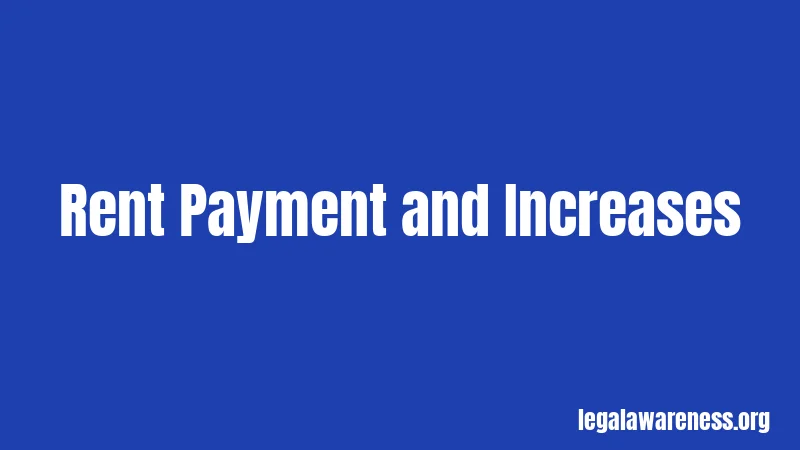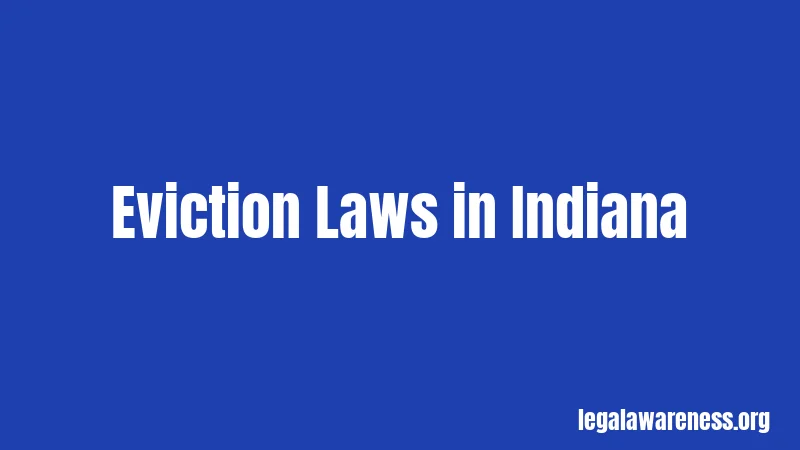Indiana Tenant Laws (2026): Your Rights and Responsibilities
Most people don’t know what landlords can and can’t do. Seriously. But in Indiana, tenant rights are actually pretty clear once you understand them. The laws protect you in ways you might not realize. Let’s break down everything you need to know about renting in Indiana.
Whether you’re signing your first lease or you’ve rented for years, knowing your rights matters. It protects you from unfair treatment. It helps you avoid legal trouble. This guide covers the rules that apply to almost every rental situation in Indiana.
What Are Tenant Rights in Indiana?

Okay, here’s the thing. Tenant laws exist to protect people who rent. They set rules for both landlords and tenants. Indiana has specific laws that say what landlords must do and what you can demand as a renter.
Think of these laws like a contract that’s already written into every lease. Even if your lease doesn’t mention something, Indiana law probably covers it. Pretty straightforward, right?
Basic Lease Requirements
What Must Be in Your Lease?
Indiana law requires leases to include certain information. Your landlord must clearly state the rental amount and payment dates. They need to list any deposits they’re taking from you upfront.
The lease should also mention who’s responsible for repairs and maintenance. It needs to explain the consequences of breaking the lease early. Honestly, this is the part most people skip. Don’t be that person.
Deposit Laws and Rules
Here’s where things get specific. Indiana allows landlords to collect deposits. But they have to follow strict rules about how they handle that money.
Your security deposit can’t be more than the amount of one month’s rent. Landlords must put your deposit in a separate account. They can’t mix it with their own money. They also have to give you a written inventory of the property’s condition when you move in.
When you move out, this is important: your landlord must return your deposit within 45 days. If they don’t return all of it, they have to explain in writing what deductions they made. They need to show you why they kept any money. Not doing this is illegal, and you could get your money back plus damages.
Rent Payment and Increases

How Rent Works in Indiana
Your landlord can charge whatever rent price you agree to. There’s no rent control in Indiana. But there are rules about how they can raise it.
Here’s the key part: your landlord can only raise rent when your lease ends. They can’t raise it in the middle of your lease unless the lease specifically says they can. If your lease doesn’t mention rent increases, the rent stays the same for the entire lease period.
Rental Rate Changes
Wondering what happens when your lease renews? Your landlord can increase the rent for the next lease period. But they have to give you notice first. Most leases require 30 to 60 days’ notice before a rent increase takes effect.
This matters because you need time to decide. Do you accept the new price? Do you move out? Either way, you deserve notice so you can plan ahead.
Repairs and Maintenance
What Landlords Must Provide
This one’s critical. Indiana law says landlords must keep rental units “fit for human habitation.” That’s a fancy way of saying the place has to be safe and livable.
Your landlord must provide working heat during winter months. The plumbing has to work. Doors and windows need to be secure. The roof can’t leak. Basically, the rental needs to be a safe place to live. If it’s not, that’s on the landlord.
How to Report Maintenance Issues
Found a problem? Here’s what you need to do. Tell your landlord about it in writing. A text message, email, or letter all work. Make sure you have proof you reported it.
Give your landlord a reasonable time to fix it. Usually, that means a few days for urgent issues. Bigger repairs might take longer. But your landlord can’t ignore serious problems. If they do, you have options. You can pay for the repair yourself and subtract it from rent. You can contact a lawyer. You can break your lease legally.
Wait, it gets better. If the condition makes the unit uninhabitable, you might not have to pay full rent. Some rental units aren’t worth full payment if they’re not properly maintained. Document everything with photos and dates.
Eviction Laws in Indiana

What Counts as Legal Eviction?
Stay with me here. Eviction is a serious process. Your landlord can’t just throw you out. They have to follow specific legal steps.
In Indiana, a landlord must give you notice to quit. This notice states why they want you to leave. It gives you a chance to fix the problem or move out. If you don’t leave, they file for eviction in court.
Notice Periods
The notice period depends on the reason for eviction. If you didn’t pay rent, your landlord must give you 10 days’ notice. If you broke your lease in another way, the notice period is usually 30 days.
For eviction due to nonpayment, your landlord can file for eviction after the 10 days pass. For other lease violations, they need to give you 30 days. This is the time to fix the problem or prepare to move.
Court Eviction Process
Here’s where it gets legal. If you don’t leave after notice, your landlord files a “forcible detainer” action in court. You have the right to appear in court. You can defend yourself. You can explain your situation to a judge.
The court will decide whether the eviction is legal. If the judge sides with the landlord, you’ll have a set number of days to move. You can’t be physically removed before that deadline. This whole process takes time. It’s not instant.
Illegal Eviction Methods
Okay, this one’s important. Your landlord cannot do certain things. They can’t lock you out. They can’t remove your belongings. They can’t shut off your utilities to force you to leave.
These actions are illegal “self-help” evictions. If your landlord tries this, you have legal grounds to sue them. You could win damages. You could even break your lease and stay rent-free for the remaining period. Don’t let landlords get away with this.
Tenant Privacy Rights
Entry Rights for Landlords
Your home is your private space. Landlords can’t just enter whenever they want. Indiana law gives you protection here.
Your landlord can only enter for specific reasons. These include inspections, showing the unit to potential tenants, repairs, and emergencies. They need to give you 24 hours’ notice before entering. For emergencies like fires or medical situations, they don’t need notice.
What Counts as an Emergency?
Wondering what qualifies? A fire, gas leak, or burst pipe counts as an emergency. So does a situation where someone’s safety is at risk. But your landlord can’t claim an emergency just to avoid giving notice.
Landlord Responsibilities
Habitability Standards
Indiana landlords must maintain rental units to housing codes. The property must have adequate heat during winter. Plumbing must work properly. The roof can’t leak into living areas.
There must be working locks on doors and windows. The electrical system needs to be safe. Walls and floors must be in decent condition. The landlord has to address pest problems quickly. This isn’t optional. It’s the law.
Lead Paint Disclosure
Listen, this matters if the unit was built before 1978. Federal law requires landlords to disclose lead paint hazards. They must give you written notice before you sign the lease.
You have 10 days to get a lead inspection if you want one. Your landlord has to provide information about lead paint risks. This protects your health, especially if you have kids.
Tenant Responsibilities
Payment and Lease Compliance
You’re responsible for paying rent on time. That’s the big one. Late payments can lead to eviction. Pay on the due date stated in your lease.
You also need to follow the lease terms. That means no unauthorized occupants. Keep the unit reasonably clean. Don’t damage the property beyond normal wear and tear. These are your basic responsibilities.
Property Care
Normal wear and tear is okay. That’s expected from living in a space. But you can’t punch holes in walls. You can’t damage flooring intentionally. You can’t leave the place filthy.
When you move out, you have to leave the unit in clean condition. The landlord can deduct from your deposit for damage you caused. But they can’t charge for normal aging or wear. This is an important difference.
Discrimination Laws
What’s Illegal for Landlords
Hold on, this is really important. Your landlord cannot discriminate against you. That means they can’t treat you differently based on certain protected characteristics.
You’re protected from discrimination based on race, color, national origin, religion, sex, disability, or familial status. That means families with kids. The Fair Housing Act protects you. Indiana has its own fair housing law too.
Your landlord can’t refuse to rent to you because of these reasons. They can’t charge different rent. They can’t give you worse treatment than other tenants. They can’t apply lease rules unfairly.
What You Can Do If Discriminated Against
Face discrimination? You can file a complaint with HUD. That’s the U.S. Department of Housing and Urban Development. You can also contact Indiana’s civil rights agency. Both offices investigate discrimination complaints.
You could also sue your landlord. You might win damages. You might even break your lease if discrimination is severe. Don’t stay silent about discrimination.
Security Deposit Returns
Timeline for Getting Your Deposit Back
Okay, pause. Read this carefully. Landlords must return your security deposit within 45 days of move-out. That’s the law in Indiana. No extensions. No delays for “processing.”
If your landlord keeps any money, they must provide an itemized list. This should show exactly what they charged you for. It needs to be detailed. Generic deductions aren’t allowed.
What Can Be Deducted?
Landlords can deduct for actual damage you caused. Broken windows, large holes in walls, or stains that won’t come out. They can deduct for rent you didn’t pay. They can deduct for utilities you owed.
But they cannot deduct for normal wear and tear. A few nail holes from hanging pictures? Not deductible. Slightly worn carpet from living in the unit? Not deductible. Faded paint? Not deductible.
This confuses a lot of people. If you’re unsure, ask your landlord in writing to explain each deduction. Keep photos of the unit when you move out. This protects you if there’s a dispute.
Breaking Your Lease Early
When You Can Break a Lease
Sometimes you need to move before your lease ends. Indiana law allows this in certain situations. If the unit becomes uninhabitable, you might be able to leave without penalty.
If your landlord harasses you or violates your rights seriously, you can break your lease. If your landlord tries an illegal eviction, you can leave. If the unit has major code violations your landlord won’t fix, you have grounds to break it.
You can’t just leave because you want to. That would give your landlord the right to sue you for remaining rent. But legitimate violations give you legal grounds.
Military Service Exception
Here’s one people often miss. If you’re in the military and you get deployed, you can break your lease. Federal law allows this. You need to provide proof of your orders. This applies even if your lease doesn’t mention it.
Roommate and Subletting Rules
Subleasing Rights
Want to move out but can’t break your lease? Subletting might work. This means finding someone else to take over your lease for the remaining time.
Your landlord can’t unreasonably refuse a qualified subletter. Indiana law says landlords must act fairly. But they can require the subletter to pass the same screening you did. They can check credit and background.
Adding Roommates
Planning to add a roommate? You typically need landlord approval first. Check your lease. Most leases require written permission before anyone new moves in.
Your landlord can’t unreasonably refuse. But they can require your roommate to sign the lease or a roommate agreement. They can do a background check. They need to treat this fairly and consistently with other tenants.
Utilities and Services
Landlord Obligations for Utilities
Okay, here’s something important. If utilities are included in your rent, your landlord must provide them. They can’t shut off heat, water, or electricity as punishment. That’s illegal and dangerous.
Some leases say the tenant pays certain utilities. Others say the landlord pays. Whatever your lease says, the landlord must keep the unit habitable. That means adequate heat in winter. That means water pressure. That means working electrical outlets.
What Happens If Utilities Stop?
If your landlord cuts off utilities illegally, you have options. You can pay to restore them and subtract the cost from rent. You can break your lease legally. You can contact your local housing authority.
Document everything with dates and photos. Keep receipts for any money you spend. This proof matters if you end up in court.
Frequently Asked Questions
How much notice does my landlord need to show the unit to new tenants? Your landlord needs to give you 24 hours’ notice before showing the unit to anyone. They can’t show it without warning. If they do, that violates your privacy rights.
Can my landlord keep my entire security deposit for any reason? No. They can only deduct for actual damages or unpaid rent. Normal wear and tear isn’t deductible. If they can’t explain specific deductions, you can sue to get your money back.
What should I do if my landlord won’t fix major maintenance issues? First, report it in writing and keep a copy. Give them a reasonable time to fix it. If they don’t, you can pay for the repair yourself and deduct it from rent. Document everything with photos and receipts.
Can my landlord raise my rent in the middle of my lease? Generally no, unless your lease specifically allows it. Rent can only go up when your lease renews. Your landlord needs to give proper notice before the increase takes effect.
What’s the difference between “notice to quit” and an eviction? A notice to quit is a warning that you need to leave or fix a lease violation. An eviction is a court case. If you don’t leave after getting notice, your landlord can file for eviction in court.
Final Thoughts
Now you know the basics of Indiana tenant law. You understand your rights and your responsibilities. Knowing this stuff protects you from unfair treatment. It helps you make smart decisions about your rental.
Keep these laws in mind when signing a lease. Review your lease carefully. Ask questions about anything unclear. Don’t let anyone pressure you into signing something you don’t understand.
If problems come up, handle them in writing. Keep records. Get help from a tenant rights organization if needed. Stay informed, stay safe, and don’t hesitate to ask a lawyer when things get complicated.
References
Indiana Residential Tenancies – Indiana Code 32-31-1 through 32-31-8.1 https://iga.in.gov/legislative/laws/statute/ic32-31
Indiana Fair Housing Law – Indiana Code 22-9-1 https://iga.in.gov/legislative/laws/statute/ic22-9
U.S. Department of Housing and Urban Development (HUD) https://www.hud.gov
Indiana Civil Rights Commission – Fair Housing Complaints https://www.in.gov/icrc
National Low Income Housing Coalition – Indiana Resources https://nlihc.org
Legal Aid Organization – Indiana – Free Legal Help for Low-Income Renters https://www.indianalegalservices.org
